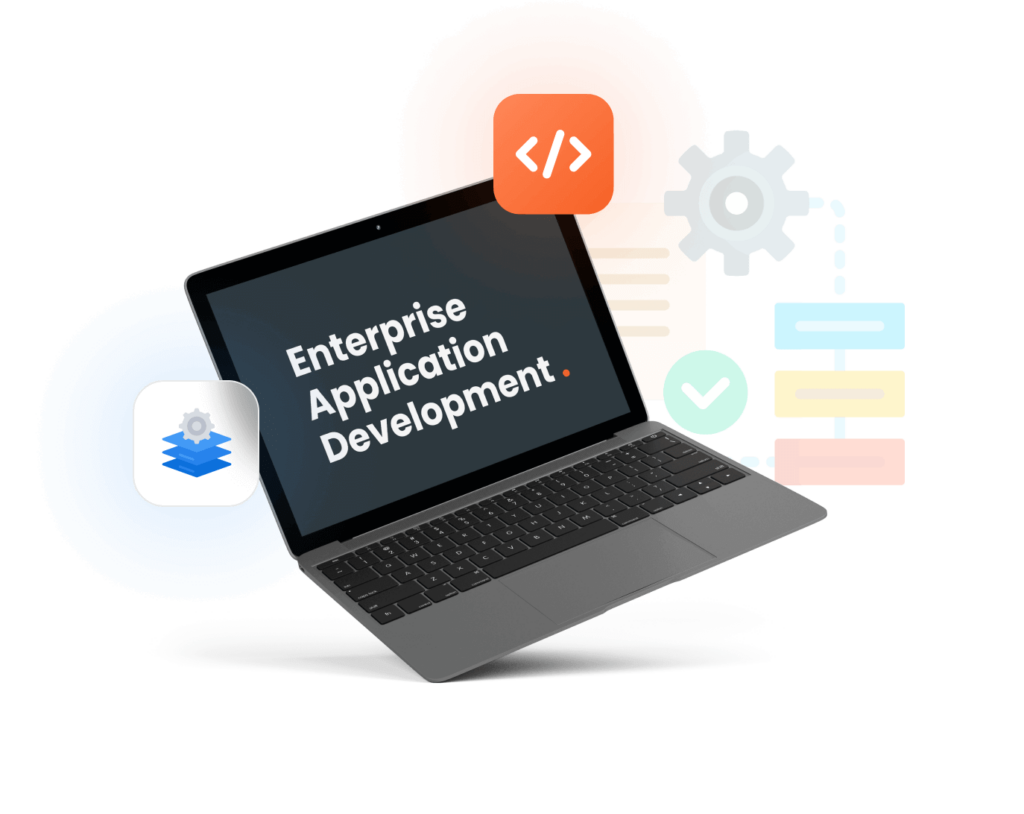> Services> Enterprise Application Development
Enterprise Application Development
extend the capabilities of your systems with Enterprise Application Development

a reflection of our clients’ success.
Enterprise application development - powerful software to optimize complex business operations
Accelerate your business goals with our results-driven enterprise application development. We specialize in crafting integrated solutions that optimize workflows, boost productivity, and deliver a rapid return on investment.
Our integration services are designed to empower your organization to leverage the full potential of its technology investments. We specialize in crafting custom solutions that seamlessly connect your applications, automating workflows and optimizing your processes. Our team of integration specialists will integrate your systems, enabling your teams to focus on strategic initiatives rather than technical complexities.
Our data conversion services empower organizations to navigate technology transformations with confidence. We specialize in translating complex data from legacy systems to modern platforms. Our team of experts handles schema mapping and data cleansing with precision. With our services, you can accelerate project timelines and mitigate risks. Trust our proven methodologies to deliver reliable data conversions.
Building enterprise applications requires careful planning & consideration of various factors.


Why Choose Slick for Enterprise Application Development.

-
Team-Based Approach
Developer Support
We don't just assign developers; we support them with a team of resources including solution leads, project managers, scrum managers, and technical architects.
Developer Support
Solution leads ensure requirements are translated properly, and project managers simplify the customer experience by providing clear communication and oversight of the project plan.
Technical Excellence
Technical architects ensure applications are built to be robust, scalable, and maintainable.
-
Proven Track Record
Hundreds of Projects
Delivered successfully for hundreds of customers.
Five-Star Rating
Hold a perfect 5-star rating on Google. -
Global Developer Network
Optimal Cost and Time Zone Alignment
Leverage developers in South America, East Europe, India, Bangladesh, and the United States to best fit project needs and timelines. -
Fast and Agile Delivery
Reusable Components
Start with common application building blocks for rapid initial deployment.
Iterative Approach
Emphasize quick, initial software releases followed by continuous improvement in an agile manner. -
Expert Application Integration
Enterprise and Custom Integration
Seamlessly connect and synchronize enterprise applications and custom solutions with all types of systems. -
Consultation & Estimates
Free Consultation
Offer no-obligation discussions to explore possibilities and provide initial cost estimates.
Transparency
Provide clear, conceptual overviews of what's achievable within different budgets.
Our Process to get you started.
-
Requirements
Effective requirements gathering in enterprise application development goes beyond features. It involves workshops with stakeholders to understand user needs, workflows, and the existing application ecosystem. This ensures the custom software integrates seamlessly, avoiding data silos and boosting efficiency. -
Estimation & Planning
Accurate estimates for enterprise applications require collaboration. Working with developers defines deliverables, timelines, and milestones. This transparency ensures cost estimates reflect project complexity and resource needs, keeping development on track and within budget. -
Delivery
Delivering enterprise applications goes beyond coding. Clear communication, regular demos, and user testing are key. This collaborative approach, combined with agile development, ensures a flexible delivery process that aligns with your vision and maximizes value. - Get in Touch

Enterprise Application Development FAQ
Enterprise applications can streamline workflows, automate tasks, improve data management, enhance collaboration across departments, and provide a competitive edge by addressing your unique business challenges. Check out this article by IBM to learn more about the countless benefits of enterprise application development.
B2B (Business-to-Business): Applications focused on interactions between your company and other businesses might need functionalities like secure data exchange, supplier management, or partner portals.
B2C (Business-to-Consumer): Applications focused on customer interactions might require features like e-commerce functionalities, customer relationship management (CRM) tools, or self-service portals.
Discuss ongoing maintenance and support options with the development team. This might include bug fixes, security updates, and feature enhancements to ensure the long-term success of your application. Check out our approach or contact us and we are sure we can ease any concerns you may have with your enterprise application development.
Navigate
- Enterprise application development tailors powerful software to optimize complex business operations
- Building enterprise applications requires careful planning & consideration of various factors.
- Let’s Work Together To Create Your Perfect Product
- Why Choose Slick for your Enterprise Application Development
- Our Process to Get You Started.
- Enterprise Application Development FAQ

